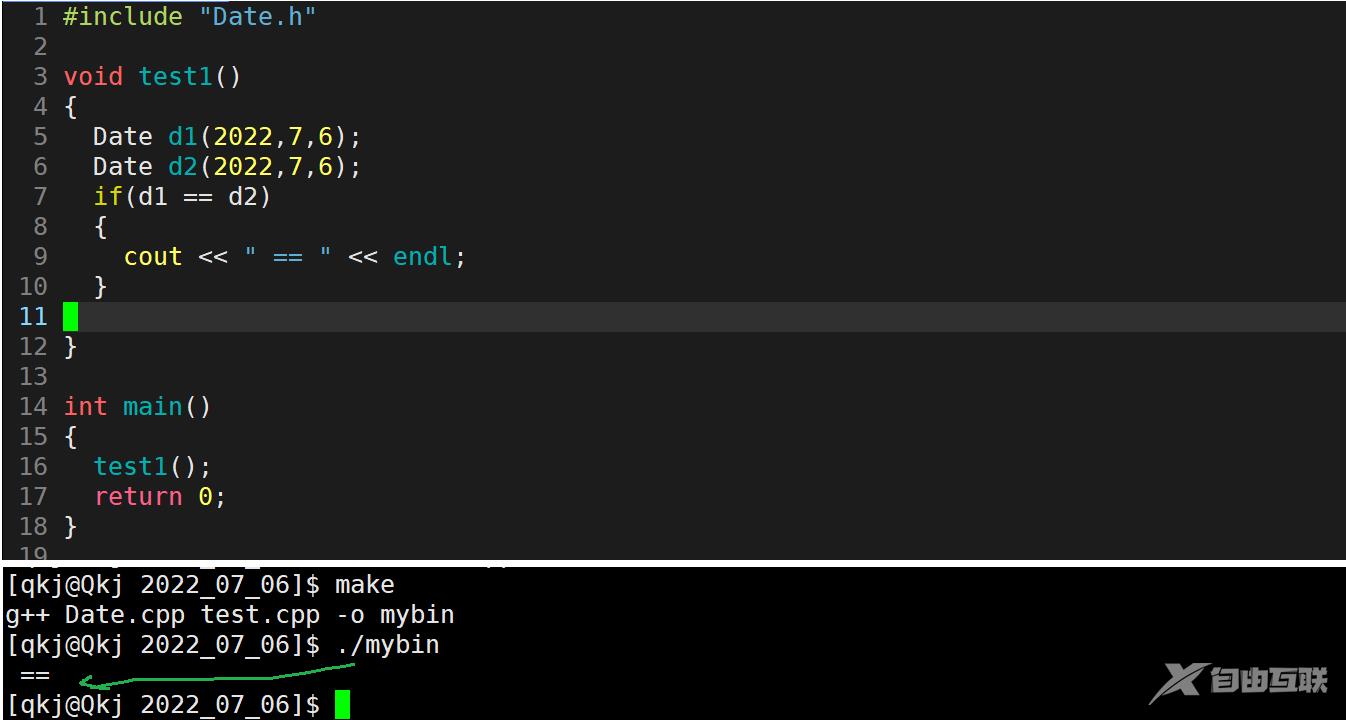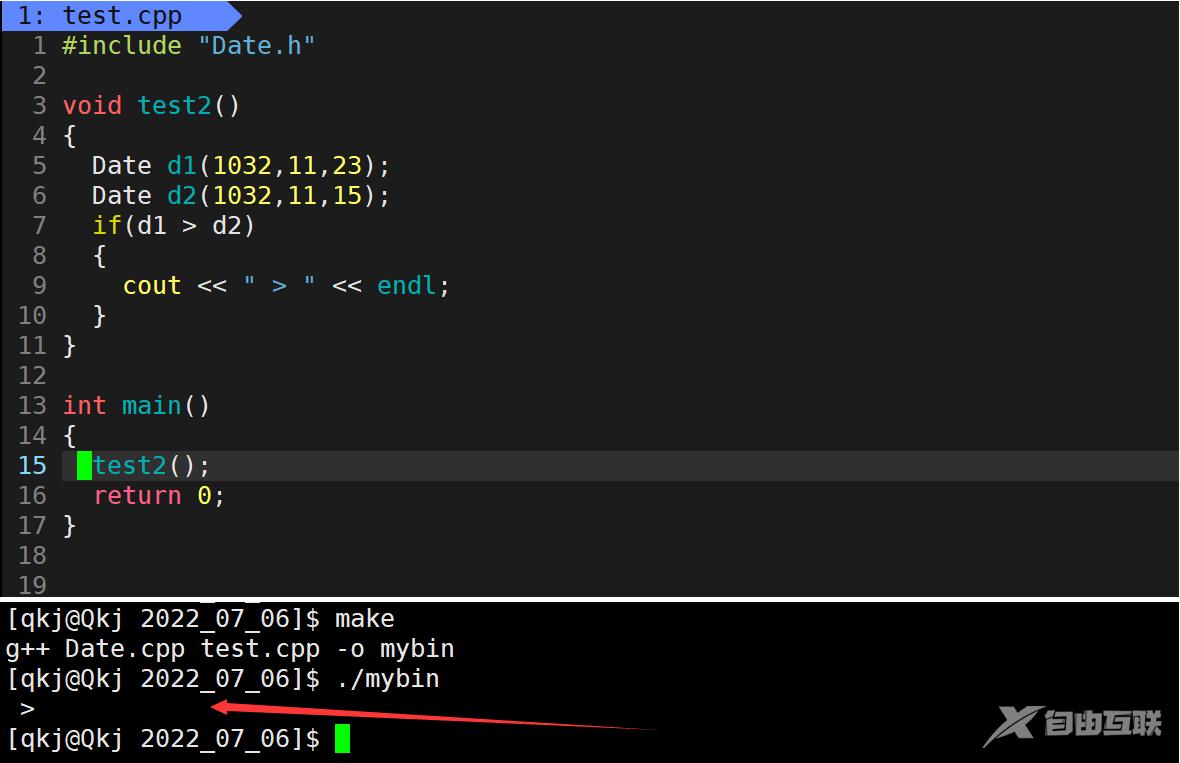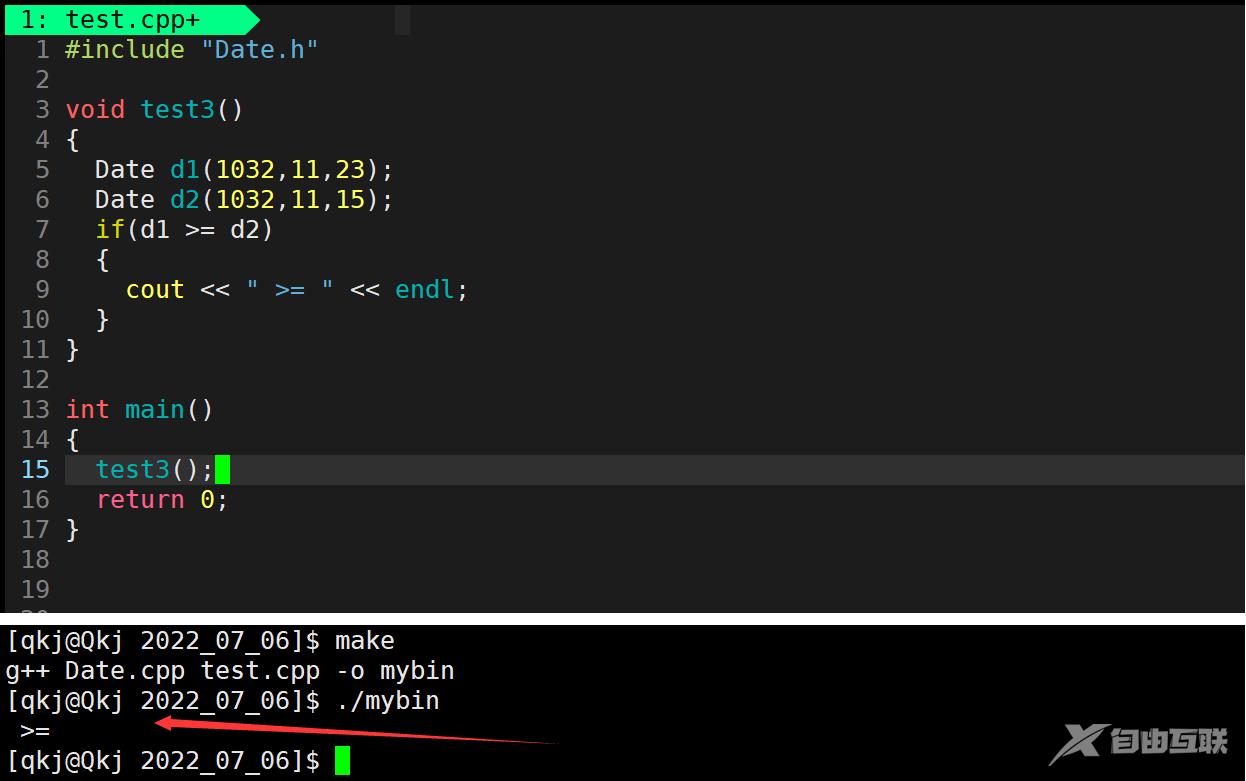目录
- 写在前面
- 成果
- 准备工作
- 构造函数
- 判断平年 or 闰年
- 判断天数是否合理
- 写好构造函数
- 析构函数 & 拷贝构造
- 运算符重载
- 逻辑运算符的重载
- 重载 ==
- 重载 >
- 重载 >=
- 重载 <
- 重载 <=
- 重载 !=
- 算数运算符的重载
- 重载 =
- 重载 +
- 重载+=
- 重载 -
- 重载-=
- 重载++
- 重载 –
- 重载流提取 & 流插入
写在前面
我们今天写一个Date类作为C++初始类的结尾,这里涉及到的知识,里面有很多运算符的重载,包括权限的问题,我们都已经分享过了,所以大家不用担心,这里算是一个总结吧.我这里用的的是Linux环境,主要是锻炼自己的能力.
成果
我们要完成一个什么样的Date类呢,大家可以搜一下时间计算器,我们就完成他们的功能,比如说加减300天或者看看两个日期之间的天数,这就是我们要完成的任务.

准备工作
这里我们用三个文件来写,分别是Date.h,Date.cpp,test.cpp.我们先把初始工作给做好了,我们先把框架各搭出来,后面要的功能一一补足.
Date.h
#include <iostream>
#include <assert.h>
using std::cout;
using std::endl;
class Date
{
public:
Date(int year = 1900, int month = 1, int day = 1);
//析构函数
~Date();
// 拷贝构造
Date(const Date& d);
private:
int _year;
int _month;
int _day;
};
Date.cpp
#include "Date.h"
Date::Date(int year, int month, int day)
{
}
~Date()
{
}
Date(const Date& d)
{
}
test.cpp
#include "Date.h"
int main()
{
return 0;
}
构造函数
我们先来写一下日期类的构造函数,本来这是没有多少问题的,但是我们知道一个月的天数是有限制的,而且还有闰年于平年之分,这就考虑的有点难度了,但是这要符合我们的客观规律.我们先来把思路捋顺.
第一点 我们把年月份给对象,其中肯定都是大于0的整数,这个是毋庸置疑的,第二步,我们要判断这一年是平年还是闰年,第三步,要判断给的月数的对应的天数是否合理.
我们分别用方法来完成自己的要求.
判断平年 or 闰年
这个很简单,记得去类里面声明这个方法.
bool Date::isLeap(int year)
{
assert(year > 0);
return (year % 4 == 0 && year %100 != 0)
|| year % 400 == 0;
}
判断天数是否合理
我们都知道每一月分都有固定的天数,而且月份是肯定小于13的,
int Date::isLegitimate(int year,int month)
{
static int monthDay[13] = {0,31,28,31,30,31,30,31,31,30,31,30,31};
assert(month > 0 && month < 13);
assert(day > 0);
//判断闰年 && 而且 月份是 2 月
if(isLeap(year) && month == 2)
{
return 29;
}
return monthDay[month];
}
我来解释一下我们定义数组的时候为什么用的是 static ? 我们知道,这是一个函数,也就是说函数栈帧会在结束后销毁,但是我们可能多次调用这个函数,为了避免多次开辟和销毁该数组的空间,这里直接用static修饰得了.
写好构造函数
到这里我们已经写好了的构造函数,没必要在说其他了.
Date::Date(int year = 1900, int month = 1, int day = 1)
{
if(year > 0 && month > 0 && month <13 && day <= isLegitimate(year,month))
{
_year = year;
_month = month;
_day = day;
}
else
{
// 这里应该抛出一个异常
// 现在我还不太会 暂时用 assert代替
assert(NULL);
}
}
析构函数 & 拷贝构造
说实话,这两个函数我们不用写,主要是我们没有使用动态开辟空间,都是一些基本的内容,编译器生成的已经完全够了,这里大家看看就行了.
由于这两个函数都不大,这里就声明成内联函数函数吧,在类内实现.
// 析构函数
inline ~Date()
{
_year = 0;
_month = 0;
_day = 0;
}
// 拷贝构造
inline Date(const Date& d)
{
_year = d._year;
_month = d._month;
_day = d._day;
}
运算符重载
某种意义上,运算符重载才是我们今天的大头,我们不是重载所有的运算符,而是要重载那些符合我们逻辑的,例如一个日期加上一个日期就没有什么意义,这里就不会重载它.
逻辑运算符的重载
这个基本的逻辑运算符都有意义,这里我们一一给大家重载出来,同时也验证一下.
重载 ==
这个很好写,如果日期的年月日都相等,那么这两个日期一定相等.
bool Date:: operator==(const Date& d) const
{
return _year == d._year
&& _month == d._month
&& _day == d._day;
}

重载 >
如果一个日期的年数比较大,那么它一定更大,如果相等,就比较月份,如果月份还相等,那就比较天数,这就是这个的原理.
bool Date:: operator>(const Date& d) const
{
return (_year > d._year)
||(_year == d._year && _month > d._month)
||(_year == d._year && _month == d._month && _day > d._day);
}

重载 >=
只要我们完成了上面的两个,后面就可以直接调用它们了,避免重复造轮子.
bool Date::operator>=(const Date& d) const
{
return *this > d || *this == d;
}

重载 <
从这里开始,我就不演示结果了,都是和之前的一样.
我们知道,小于的对立面就是大于大于等于
bool Date::operator<(const Date& d) const
{
return !(*this >= d);
}
重载 <=
小于等于的对立面是大于,我们已经实现了.
bool Date::operator<=(const Date& d) const
{
return !(*this > d);
}
重载 !=
这个更加简单,不等于不就是等于的对立面吗
bool Date::operator!=(const Date& d) const
{
return !(*this == d);
}
算数运算符的重载
上面的都挺简单的,这里算数运算符我们要重载的有加法,等于,减法,前置和后置++…有一定的额难度,尤其是加法和减法.
重载 =
等于的重载基本来说对于我们是没有任何问题的,但是有一点是需要我们注意的,无论是C语言还是C++都是支持连等的,也就是a = b = c,那就意味者我们们重载等于的时候是要有返回值的.
Date& Date::operator=(const Date& d)
{
// 避免 重复
if(this != &d)
{
_year = d._year;
_month = d._month;
_day = d._day;
}
return *this;
}
重载 +
说实话,加号还是比较简单的,我们首先要把给的天数判断一下,假如要是小于零,就去调用重载的减号,后面我会实现减法的,这里先考虑好.
那么我们该如何把这个逻辑给完善好呢?第一步,就是把给的天数直接加到_day上面,如果还没有超过当前月最大的天数,我们就直接返回这个日期就可以了,否则就把日期减去当前月最大的天数,当前月加一,注意,这里要明白,如果当前月是12月,我们直接把月份置为1,年加上一,这里要注意一点东西 ,我们不修改原来的日期
我们可以分为三种情况,每一个我都列出来,本质上是一个循环.
- 2022-2-1 + 12 _day = 13 < 2月份的最大值,返回 2022-2-13
- 2022-4-30 + 7 _day = 37 > 4月份最大值, _day-=30 月份+1 = 5,我们发现 _day = 7 < 5月份的最大值,循环结束
- 2022-12-31 + 2 _day = 33 > 12月份最大值, _day-=31,月份是12,直接置为1, _year加1,继续循环,判断 _day = 2是不是满足循环条件
Date Date::operator+(const int day) const
{
//先判断 day 是否是 小于零
if(day < 0)
{
return (*this)-(-day);
}
// 第一步 来个第三方 不要修改原来的
Date ret(*this); // 这是拷贝构造
ret._day += day;
while(ret._day > ret.isLegitimate(ret._year,ret._month))
{
ret._day -= ret.isLegitimate(ret._year,ret._month);
if(ret._month == 12)
{
ret._month = 1;
ret._year += 1;
}
else
{
ret._month += 1;
}
}
return ret;
}
重载+=
我们直接复用+和=就可以了,这里没什么可以分享的.
Date& Date::operator+=(const int day)
{
//判断 是不是 小于 0
if(day < 0)
{
return (*this) = (*this) - (-day);
}
return (*this) = (*this) + day;
}
重载 -
我们们这里要重载加号的的话,需要分为两种共请情况
- 参数 是 天数
- 参数 是 日期
很荣幸,C++是支持重载的,我们也按照步骤来.
参数是天数
这个就是计算一个日期减去多少天得到另一个日期,也是比较简单的,我们要考虑一些之情况,这里小于零的情况就不解释了,主要看我们的思路是什么.
我们首先把_day减去day,判断是不是小于0,小于的话,就从上个月的日期天数加到 _day上,直到它它大于0,这里要注意的是,如果我们的月份恰好是12,那么上一个月是1月份,并且年也要减1
Date Date::operator-(const int day) const
{
// day 的大小
if(day < 0)
{
return (*this) + (-day);
}
Date ret(*this);
ret._day -= day;
//开始判断 ret._day
while(ret._day <= 0)
{
// 找上一个月的
if(ret._month == 1)
{
ret._month = 12;
ret._year -= 1;
}
else
{
ret._month -= 1;
}
int days = ret.isLegitimate(ret._year,ret._month);
ret._day += days;
}
return ret;
}
参数是日期
这个更加简单的,我们计算的是两个日期之间差的天数,我们可以复用前面的方法.
还是先说下思路,我们想,如果一个较小的日期每次加一,直到加到和较大的日期完全一样,我们计算加的次数是不是就可以完成这个操作符的重载了.那么我们如何要得到更小的日期,是不是要比较,然后交换这里是不用的,我们用一个标志位.我们假设日期A比日期B小,标志位flag = 1,如果不成立,我们把flag编程-1,随即我们用日期A加上flag,进行循环.
int Date:: operator-(const Date& d)
{
// 给一个 数 来计数
int count = 0;
int flag = 1;
// 不能修改原来的,这里用一个第三方
Date ret(*this);
if(ret > d)
{
flag = -1;
}
while(ret != d)
{
ret += flag;
count++;
}
return flag*count;
}
重载-=
这个我们复用减号就可以了,就不解释了.
Date& Date::operator-=(const int day)
{
if(day < 0)
{
return(*this) = (*this)+(-day);
}
return (*this) = (*this) - day;
}
重载++
我们这就不解释前置和后置的区别了,上一个博客分享过了,直接开始吧.
前置
前置是不需要带参数的.
Date& Date::operator++()
{
*this += 1;
return *this;
}
后置
需要带一个int类型的参数
Date Date::operator++(int day)
{
Date ret(*this);
*this += 1;
return ret;
}
重载 –
既然我们都把减法给重载了,那这我们直接复用就可以了
前置
不带参数
Date& Date::operator--()
{
*this -= 1;
return *this;
}
后置
带上参数
Date Date:: operator--(int day)
{
Date ret(*this);
*this -= 1;
return ret;
}
重载流提取 & 流插入
这原理我们已经分享过了,这里就不加赘述了,记得使用友元
>>
std::istream& operator>>(std::istream& in, Date& d)
{
in >> d._year >> d._month >> d._day;
return in;
}
<<
std::ostream& operator<<(std::ostream& out, Date& d)
{
out << d._year << "-" << d._month << "-" << d._day;
return out;
}
到此这篇关于C++ Date类的具体使用(构建,重载等)的文章就介绍到这了,更多相关C++ Date类内容请搜索自由互联以前的文章或继续浏览下面的相关文章希望大家以后多多支持自由互联!
